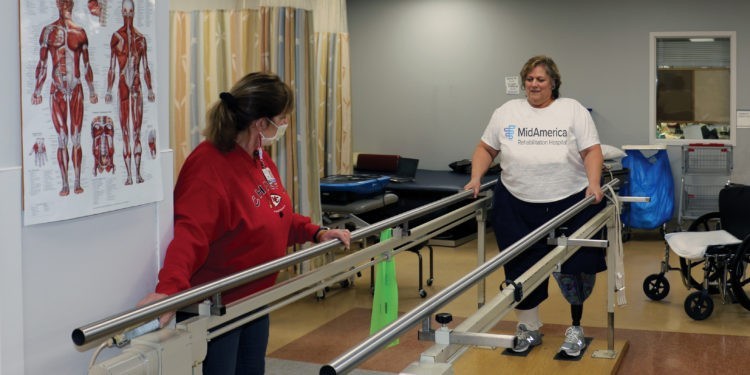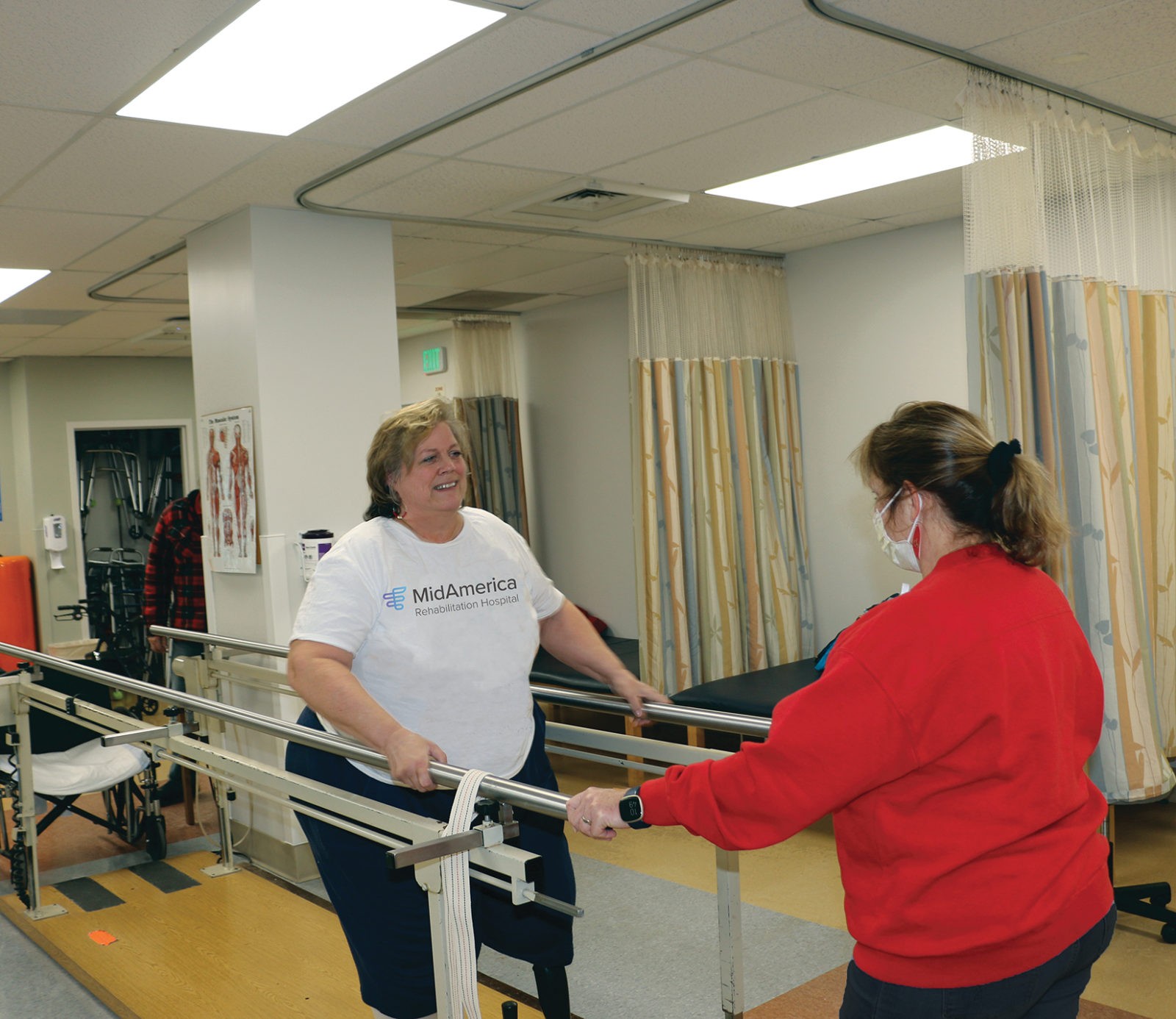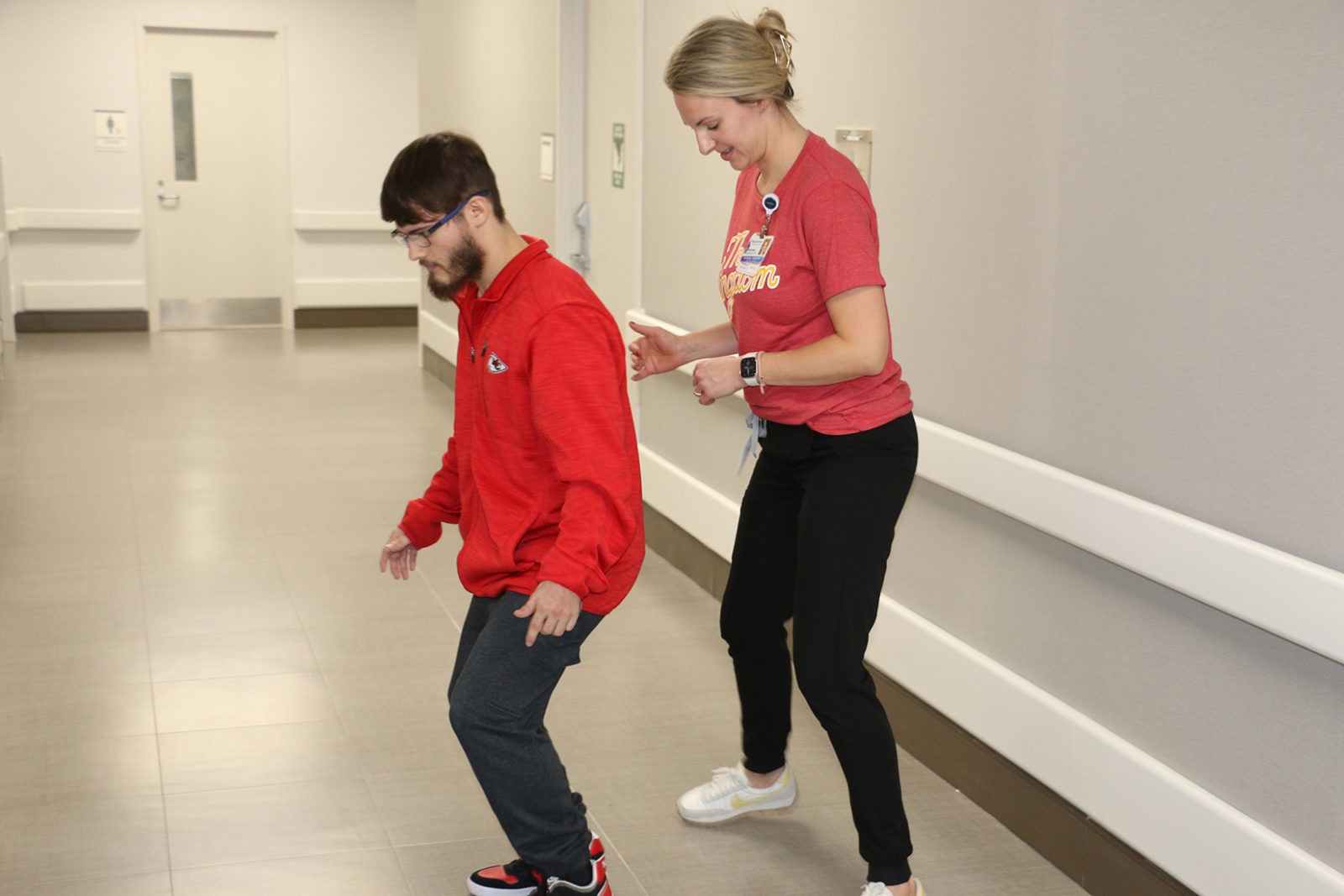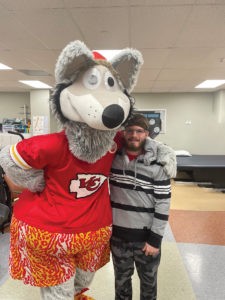MidAmerica Rehabilitation Hospital

Written by Cheri Woodsmall
March is Traumatic Brain Injury (TBI) Awareness Month, and April is Limb Loss Awareness Month. These two months are dedicated to raising awareness about these conditions and the impact they have on individuals and their families.
At MidAmerica Rehabilitation Hospital in Overland Park, Kansas, they understand the importance of providing comprehensive care to those who have experienced a TBI or limb loss. The hospital provides state-of-the-art rehabilitation services to help patients regain their independence and improve their quality of life. The staff is dedicated to helping patients achieve their rehabilitation goals, no matter how challenging they may seem.
Limb Loss Awareness Month is an opportunity to educate the public about the challenges faced by individuals who have experienced an amputation. Amputations can result in a range of physical, emotional, and psychological symptoms, including phantom limb pain, depression, and anxiety. It is essential for individuals who have experienced an amputation to receive comprehensive care to help them manage these symptoms and regain their independence. For patients like Kay, this was the most important factor when choosing MidAmerica Rehabilitation Hospital.

“It was just a normal day at work on October 18th, 2021,” recalls Kay. “I had a little pain in my leg, but nothing too concerning. By the afternoon, the pain was worse and I knew something was wrong, but I never expected what was to come.”
Kay’s co-workers ultimately called for an ambulance, and she was rushed to the hospital. “I found out I had a severe blood clot in both legs and lungs, along with internal bleeding in my left leg,” Kay says. “The doctors were worried I wouldn’t make it through the night.”
After several weeks of medical treatment, Kay woke up to the news that her left leg was going to be amputated. “I was devastated, but I knew survival was more important than keeping my leg,” she says.
Five weeks post-op, Kay arrived at MidAmerica Rehabilitation Hospital to begin her journey to recovery. “I started therapy the very next day with my therapist, Rich,” she recalls. “I went from lying in a hospital bed for weeks to sitting in a wheelchair and even standing up using an assistance machine on that first day.”
With the support of her therapy team, Kay was able to make remarkable progress. “My therapy sessions were three hours a day with a combination of occupational and physical therapy,” she explains. “What I loved is that the therapists would incorporate my visitors into my sessions. One day I was pulling my daughter around the gym with my wheelchair and arm strength, the next day my husband and I were passing a weighted ball back and forth.”
Determined to spend the holidays with her family, Kay worked tirelessly with her therapy team to reach her goal. “Using the vehicle simulator set to the actual specs of our car, I learned to get out of my wheelchair and into the car without ever stepping foot outside in the cold,” she says. “And finally, on Christmas Eve, I got the approval to go home for Christmas. I couldn’t have done it without the support of everyone at MidAmerica Rehabilitation Hospital.”
After returning home, Kay started working with an in-home physical therapist. “By May 2022, I was ready for my first prosthetic,” she says. “I knew I wanted to go back to MidAmerica Rehabilitation Hospital, based on my positive experience there. I started working with Debbi, and we hit it off instantly.”
With the help of Debbi and her support group for amputees, Kay was able to make incredible strides. “There were times when I was down and unmotivated, but Debbi helped me get past my doubt with words of encouragement,” she says. “With her help, I took my first steps, learned to balance again, stand with my eyes closed, and even walk up and down stairs. I was making huge strides!”
Despite a setback with an infection and a condition called lymphedema, Kay was able to continue her journey to recovery. “I’m back to my therapy sessions with Debbi, and I’m on track towards walking again with my new prosthetic,” she says. “I know that I wouldn’t be where I am today without the countless hours of support, compassion, attention to detail, and overall care at MidAmerica Rehabilitation Hospital.”
MidAmerica Rehabilitation Hospital understands the importance of providing comprehensive care to individuals who have experienced an amputation.
The hospital provides state-of-the-art rehabilitation services, including physical therapy, occupational therapy, and prosthetics, to help patients regain their independence and improve their quality of life. They also work closely with loved ones to develop coping skills and help them adjust to life after amputation. Whether shaping a residual limb for a prosthesis, learning about skincare, or training on a prosthetic gate and limb maintenance, they work to answer their patient’s questions. The staff at MidAmerica Rehabilitation Hospital is dedicated to helping patients achieve their rehabilitation goals, no matter how challenging they may seem.
-
In the United States, the most common amputations are of the lower limb, accounting for about 80-85% of all amputations.
-
These statistics highlight the importance of raising awareness about the challenges faced by amputees and the need for continued support and resources for those living with limb loss.
-
According to the Amputee Coalition, an estimated 2 million people in the United States live with limb loss.
-
Approximately 185,000 amputations occur each year in the United States, with the most common causes being cancer, vascular disease, and trauma.
-
Among traumatic amputations, the most common causes are motor vehicle accidents, falls, and crush injuries.
-
The highest rate of amputations occurs in people over the age of 65.
-
In the United States, the most common amputations are of the lower limb, accounting for about 80-85% of all amputations.
These statistics highlight the importance of raising awareness about the challenges faced by amputees and the need for continued support and resources for those living with limb loss.

Traumatic Brain Injury (TBI) is a serious and often life-altering condition that affects millions of people each year. March is designated as TBI Month, a time to raise awareness about this condition, the challenges it poses to those who live with it, and the resources and support available to help.
At MidAmerica Rehabilitation Hospital in Overland Park, KS, a team of highly trained medical professionals work tirelessly to help patients recover from TBI and regain their independence. The hospital provides a range of services and treatments, including physical, occupational, and speech therapy, as well as specialized programs to help patients with cognitive and emotional challenges.
TBI can occur in many ways, including falls, car accidents, sports injuries, and assaults. The symptoms of TBI can be physical, cognitive, emotional, or a combination of all three. Depending on the severity of the injury, patients may experience a range of symptoms, including headaches, dizziness, memory loss, difficulty concentrating, and mood swings.
TBI Awareness Month is an opportunity to educate the public about the signs and symptoms of TBIs and the ways in which they can be treated and managed. TBIs can range from mild to severe and can result in a range of physical, cognitive, and emotional symptoms. Some common symptoms of TBI include headaches, dizziness, memory problems, and difficulty with concentration.
 One patient who experienced a TBI was Dylan, who survived a high-speed roll-over accident. He was ejected and found unresponsive at the scene and intubated. The accident left him with four traumatic brain injuries: a brain bleed on the left side, compound swelling on the left side, a concussion, and the worst was a diffuse-axonal injury. This last injury was located in the corpus callosum in between the right and left hemisphere of the brain. He remained in a coma for 21 days. After awaking from the coma, he began walking by mid- November and was transferred to MidAmerica Rehabilitation Hospital where he progressed very quickly. He was able to shower while standing, and his balance began improving. The staff at MidAmerica Rehabilitation Hospital worked with Dylan to come up with therapies that worked well with his ability as well as his personality. His physical therapist had him use the punching bag, which boxing was one of Dylan’s favorite activities before the accident. He progressed so well that he was discharged from inpatient after one week and able to begin outpatient therapies. What is amazing is that it’s just been five months since Dylan’s accident.
One patient who experienced a TBI was Dylan, who survived a high-speed roll-over accident. He was ejected and found unresponsive at the scene and intubated. The accident left him with four traumatic brain injuries: a brain bleed on the left side, compound swelling on the left side, a concussion, and the worst was a diffuse-axonal injury. This last injury was located in the corpus callosum in between the right and left hemisphere of the brain. He remained in a coma for 21 days. After awaking from the coma, he began walking by mid- November and was transferred to MidAmerica Rehabilitation Hospital where he progressed very quickly. He was able to shower while standing, and his balance began improving. The staff at MidAmerica Rehabilitation Hospital worked with Dylan to come up with therapies that worked well with his ability as well as his personality. His physical therapist had him use the punching bag, which boxing was one of Dylan’s favorite activities before the accident. He progressed so well that he was discharged from inpatient after one week and able to begin outpatient therapies. What is amazing is that it’s just been five months since Dylan’s accident.
In addition to traditional therapy services, MidAmerica Rehabilitation Hospital also offers specialized programs designed specifically for patients with TBI. For example, the hospital’s cognitive rehabilitation program helps patients improve their memory, attention, and problem-solving skills. The emotional wellness program helps patients with depression, anxiety, and other emotional challenges that may arise after a TBI. TBI Awareness Month and Limb Loss Awareness Month are important opportunities to raise awareness about these conditions and the impact they have on individuals and their families. At MidAmerica Rehabilitation Hospital in Overland Park, they understand the importance of providing comprehensive care to those who have experienced a TBI or amputation and are dedicated to helping patients achieve their rehabilitation goals. Whether you have experienced a TBI or amputation, know that there is support available to help.
-
According to the Centers for Disease Control and Prevention (CDC), traumatic brain injury (TBI) is a leading cause of death and disability in the United States. In a single year (2018), an estimated 2.8 million TBI-related emergency department visits, hospitalizations, and deaths occurred in the United States.
-
The highest incidence of TBI-related emergency department visits and hospitalizations occurs among children aged 0 to 4 years, adolescents aged 15 to 19 years, and adults aged 65 years and older. Males are more likely to experience TBI than females, and the highest TBI death rates occur among males aged 75 years and older.
-
Falls are the leading cause of TBI-related emergency department visits and hospitalizations, accounting for more than half (51.5%) of TBI-related hospitalizations in 2018. Motor vehicle crashes, being struck by an object, and assaults are the other leading causes of TBI.
-
TBI can have a significant impact on a person’s quality of life and daily functioning, as well as on their loved ones and the larger community. According to the Brain Injury Association of America, TBI can result in physical, cognitive, and emotional problems, including chronic headaches, difficulty with memory and concentration, depression, and increased risk of neurological conditions such as Alzheimer’s and Parkinson’s disease.
-
It is important to take steps to prevent TBI, such as wearing helmets when participating in sports or riding a bicycle, using seat belts and child safety seats, and making the home and community environments safe. Additionally, early recognition and proper medical care can help reduce the severity and long-term effects of TBI.
Look for more on Dylan’s recovery in a future issue of Healthy Kansas City!
For more information on MidAmerica Rehabilitation Hospital, visit them online at http://midamericarehabhospital.com/ or call 913.491.2400.
MidAmerica Rehabilitation Hospital is recognized by The Joint Commission Disease-Specific Care Certification in Brain Injury and Amputee Rehabilitation.






